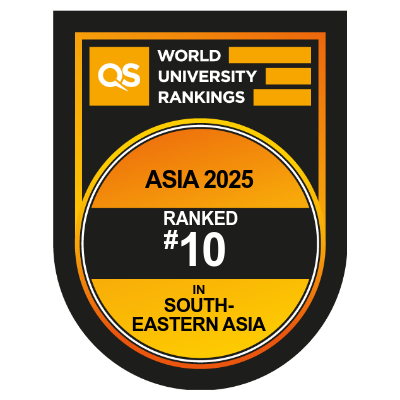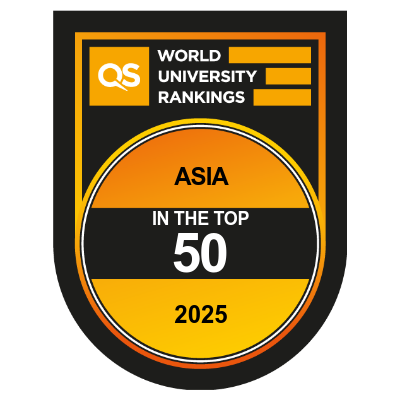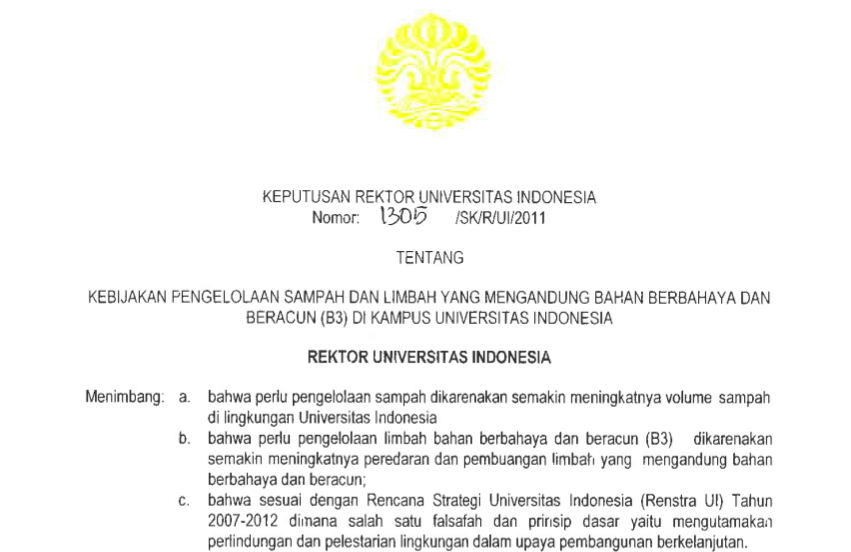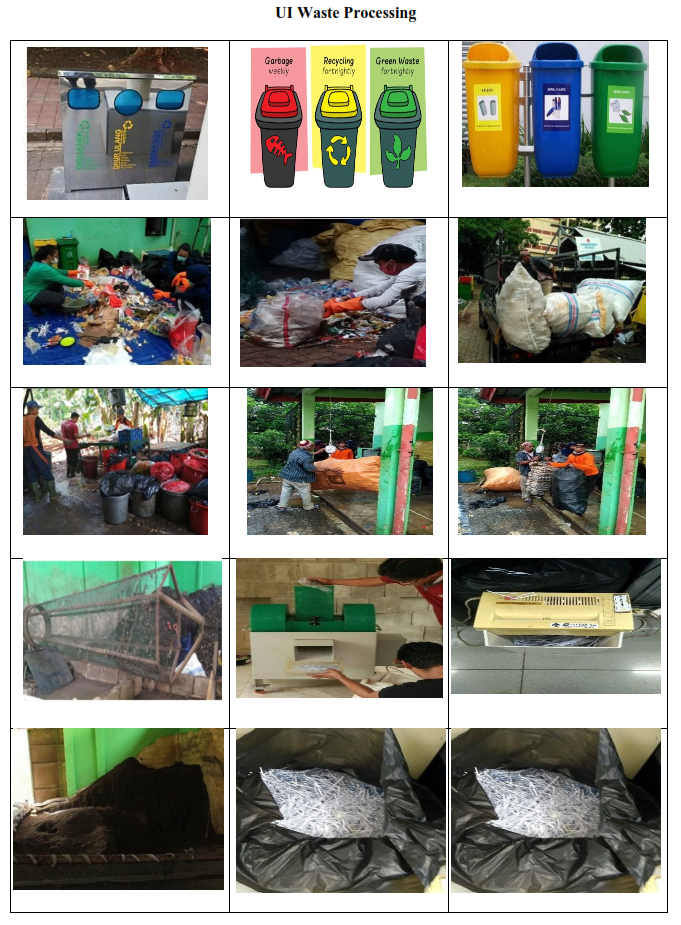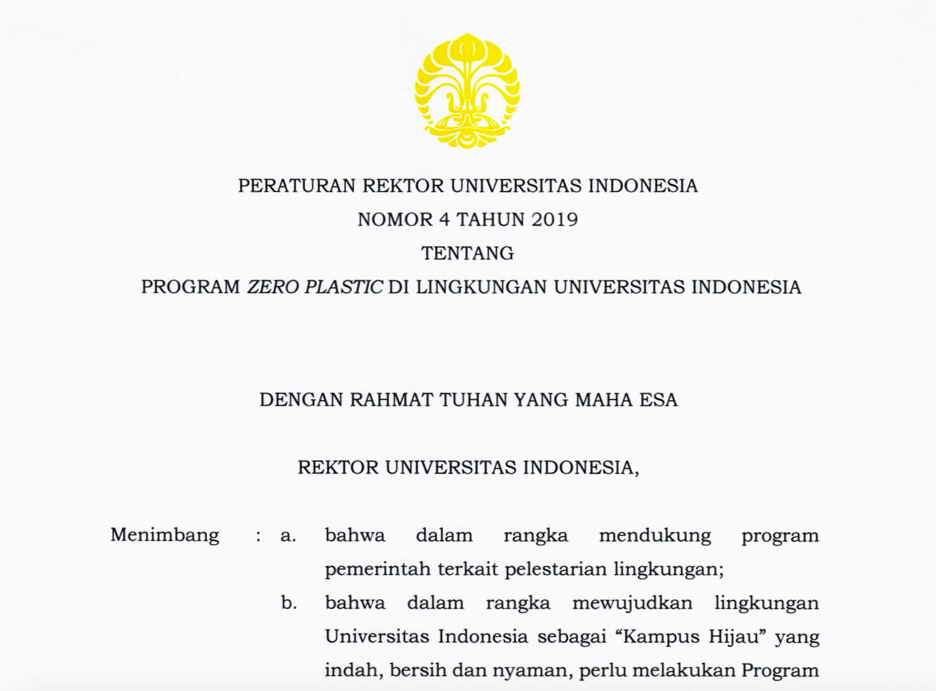Much of the world’s economy is based around producing things for consumption. This drives the engine of industry. If we want the world to develop sustainably, we need to understand how to be more responsible at both ends of this cycle.
This means promoting resource and energy efficiency, having a sustainable infrastructure, and providing access to basic services for all.
THE Impact Rankings Methodology 2022, p. 126
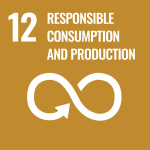
Operational measures
Universitas Indonesia has Waste and Garbage Management Policy containing hazardous and toxic materials (B3) on UI Campus, as stated in the Rector’s Decree No. 1305/SK/R/UI/2011.
B3 waste is collected and grouped separately from other waste by being given a symbol and label then sent to third parties engaged in handling B3 waste/garbage.
Universitas Indonesia has a waste disposal policy to measure the amount of waste recycled and sent to landfills. In accordance with 17 SDGs points, Universitas Indonesia makes a policy on Green Campus as stated in the UI Rector’s decree No. 2893 / SK / R / UI / 2018 concerning Green Campus Policy of Universitas Indonesia.
Universitas Indonesia classifies waste into organic, inorganic and plastic bottles to be managed according to its type, allowing it to be recycled and reused. Organic waste will be managed into compost. Inorganic waste is managed further by cleaning personnel. Liquid waste will be treated technically using grease trap shaped controls cleaned every day before being dumped into septic tank / water infiltration, so that oil / fat can be handled separately before being removed elsewhere.
Organic and Inorganic Waste Management of Psychology Faculty
Universitas Indonesia as an institution acknowledges the urgency of managing and understanding the risk of plastic waste. The awareness of waste due to single-use plastic can be achieved through enforcing a rigorous campus law that enables a transformation through education and practices toward sustainability.
Policy to Reduce the Paper and Plastic consumption on UI Campus is regulated in the UI Rector’s Decree No. 1308/SK/R/UI/2011. On December 21, 2018, the Rector of Universitas Indonesia released a restriction on Plastic and Paper consumption, then developed to become Rector’s Regulation No. 4 of 2019 concerning the UI Zero Plastic Program. The program is an effort to minimize the use or utilization of products, goods or services that cause plastic waste.
This policy is also derived to each faculty and vocational education program showing the UI’s commitment in reducing plastic use.
Guidance on reducing Plastic and paper use of Public Health Faculty
In minimizing single-use items, all teaching staff, educational staff, students, and university cleaning personnel are asked to use reusable items such as tumblers that can be refill in the drinkable-water fountain. In addition, UI also reduces the use or purchase of paper or payment of photocopies by maximizing the use of information technology systems in the mailing administration from the head. Furthermore, there are restrictions on the use of boxes for the work unit meeting activities by replacing them with plates and glasses along with gallon water for drinking water in a working meeting.
In order to support Universitas Indonesia as a green campus, UI carries out its daily activities by making changes such as reducing paper and plastic consumption in all provision of feeding tools in the workspace and other activities. For instance, there is a Decree of the Director of UI Vocational Education Program no. 114/SK/DVUI/2018. Every teaching staff in several faculties is also provided with ceramic tumbler to reduce disposable plastic bottles.
Decree of the Director of UI Vocational Education Program no. 114/SK/DVUI/2018
Public Health Faculty’ Circular Letter No. SE 042/UN2.F10.D/HKP04/2019
Minimization policies of Universitas Indonesia are in line with UI Green Campus Policies through the UI Rector’s Decree No. 2893/SK/R/UI/2018 supporting 17 SDGs targets.
The Directorate of Facility Management and Maintenance has launched a work program in UI’s Waste Management System divided into Sorting, Storage, Transportation and Processing. There is a recycling process where more than 75% of the organic waste generated at UI is processed for reuse. Waste and garbage produced by UI are transported by UI’s TPA officers.
At the faculty level, the provision of a place for battery waste and electronic waste is done in collaboration with students, with recording and monitoring. Inorganic waste is sent to a temporary trash can for further handling by the cleaning personnel and will be picked up by a third party (DPPF UI). The vendor handles renovation work waste in the form of metal, concrete, brick, glass and the like.
UI Vocational Program’s Waste Management and Sorted Waste Data
Publication of a sustainability report
Annual sustainability report has been reported by Universitas Indonesia since 2017. In 2010, sustainability report brought a theme of “Ensuring Sustainability amid the Pandemic “. For example, faculty arranges a sustainability report based on UI GreenMetric World University Rankings promoting sustainability in national and global movement.
2020 Implementation Report of Sustainable Development Goals of Universitas Indonesia
2019 Environmental Sustainability Report of Public Health Faculty
SDG 12 IN NUMBERS
Amount of waste generated
–
Amount of waste recycled
–
Percentage of waste recycled
–
RELATED NEWS
Select an image for which you want to see the achievement of the SDG indicators

